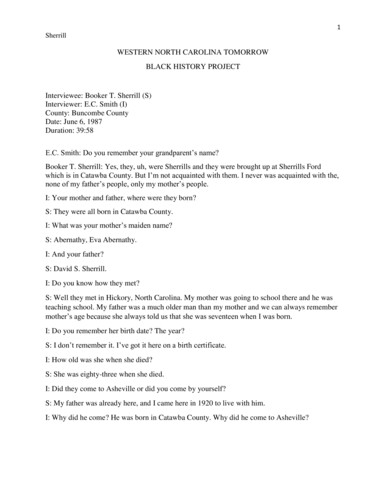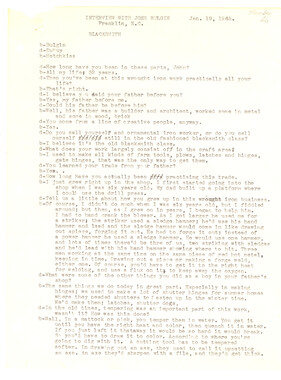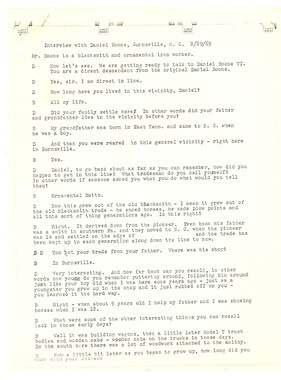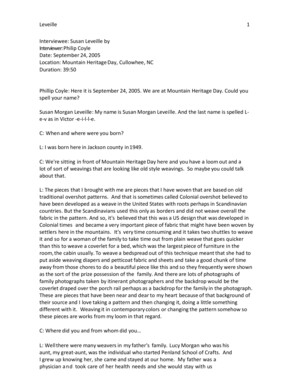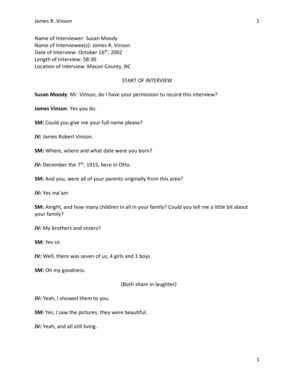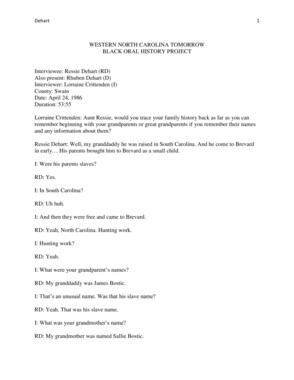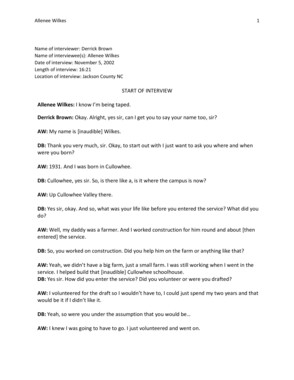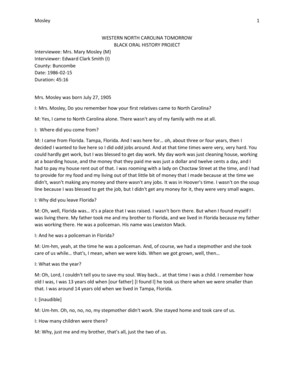Western Carolina University (20)
View all
- Canton Champion Fibre Company (2308)
- Cherokee Traditions (293)
- Civil War in Southern Appalachia (165)
- Craft Revival (1942)
- Great Smoky Mountains - A Park for America (2767)
- Highlights from Western Carolina University (430)
- Horace Kephart (941)
- Journeys Through Jackson (154)
- LGBTQIA+ Archive of Jackson County (19)
- Oral Histories of Western North Carolina (314)
- Picturing Appalachia (6679)
- Stories of Mountain Folk (413)
- Travel Western North Carolina (160)
- Western Carolina University Fine Art Museum Vitreograph Collection (129)
- Western Carolina University Herbarium (92)
- Western Carolina University: Making Memories (708)
- Western Carolina University Publications (2283)
- Western Carolina University Restricted Electronic Theses and Dissertations (146)
- Western North Carolina Regional Maps (71)
- World War II in Southern Appalachia (131)
University of North Carolina Asheville (6)
View all
- 1700s (1)
- 1860s (1)
- 1890s (1)
- 1900s (2)
- 1920s (2)
- 1930s (5)
- 1940s (12)
- 1950s (19)
- 1960s (35)
- 1970s (31)
- 1980s (16)
- 1990s (10)
- 2000s (20)
- 2010s (24)
- 2020s (4)
- 1600s (0)
- 1800s (0)
- 1810s (0)
- 1820s (0)
- 1830s (0)
- 1840s (0)
- 1850s (0)
- 1870s (0)
- 1880s (0)
- 1910s (0)
- Appalachian Region, Southern (15)
- Asheville (N.C.) (11)
- Avery County (N.C.) (1)
- Buncombe County (N.C.) (55)
- Cherokee County (N.C.) (17)
- Clay County (N.C.) (2)
- Graham County (N.C.) (15)
- Great Smoky Mountains National Park (N.C. and Tenn.) (1)
- Haywood County (N.C.) (40)
- Henderson County (N.C.) (5)
- Jackson County (N.C.) (131)
- Knox County (Tenn.) (1)
- Macon County (N.C.) (17)
- Madison County (N.C.) (4)
- McDowell County (N.C.) (1)
- Mitchell County (N.C.) (5)
- Polk County (N.C.) (3)
- Qualla Boundary (6)
- Rutherford County (N.C.) (1)
- Swain County (N.C.) (30)
- Watauga County (N.C.) (2)
- Waynesville (N.C.) (1)
- Yancey County (N.C.) (3)
- Blount County (Tenn.) (0)
- Knoxville (Tenn.) (0)
- Lake Santeetlah (N.C.) (0)
- Transylvania County (N.C.) (0)
- Interviews (314)
- Manuscripts (documents) (3)
- Personal Narratives (7)
- Photographs (4)
- Sound Recordings (308)
- Transcripts (216)
- Aerial Photographs (0)
- Aerial Views (0)
- Albums (books) (0)
- Articles (0)
- Artifacts (object Genre) (0)
- Biography (general Genre) (0)
- Cards (information Artifacts) (0)
- Clippings (information Artifacts) (0)
- Crafts (art Genres) (0)
- Depictions (visual Works) (0)
- Design Drawings (0)
- Drawings (visual Works) (0)
- Envelopes (0)
- Facsimiles (reproductions) (0)
- Fiction (general Genre) (0)
- Financial Records (0)
- Fliers (printed Matter) (0)
- Glass Plate Negatives (0)
- Guidebooks (0)
- Internegatives (0)
- Land Surveys (0)
- Letters (correspondence) (0)
- Maps (documents) (0)
- Memorandums (0)
- Minutes (administrative Records) (0)
- Negatives (photographs) (0)
- Newsletters (0)
- Newspapers (0)
- Occupation Currency (0)
- Paintings (visual Works) (0)
- Pen And Ink Drawings (0)
- Periodicals (0)
- Plans (maps) (0)
- Poetry (0)
- Portraits (0)
- Postcards (0)
- Programs (documents) (0)
- Publications (documents) (0)
- Questionnaires (0)
- Scrapbooks (0)
- Sheet Music (0)
- Slides (photographs) (0)
- Specimens (0)
- Speeches (documents) (0)
- Text Messages (0)
- Tintypes (photographs) (0)
- Video Recordings (physical Artifacts) (0)
- Vitreographs (0)
- WCU Mountain Heritage Center Oral Histories (25)
- WCU Oral History Collection - Mountain People, Mountain Lives (71)
- Western North Carolina Tomorrow Black Oral History Project (69)
- A.L. Ensley Collection (0)
- Appalachian Industrial School Records (0)
- Appalachian National Park Association Records (0)
- Axley-Meroney Collection (0)
- Bayard Wootten Photograph Collection (0)
- Bethel Rural Community Organization Collection (0)
- Blumer Collection (0)
- C.W. Slagle Collection (0)
- Canton Area Historical Museum (0)
- Carlos C. Campbell Collection (0)
- Cataloochee History Project (0)
- Cherokee Studies Collection (0)
- Daisy Dame Photograph Album (0)
- Daniel Boone VI Collection (0)
- Doris Ulmann Photograph Collection (0)
- Elizabeth H. Lasley Collection (0)
- Elizabeth Woolworth Szold Fleharty Collection (0)
- Frank Fry Collection (0)
- George Masa Collection (0)
- Gideon Laney Collection (0)
- Hazel Scarborough Collection (0)
- Hiram C. Wilburn Papers (0)
- Historic Photographs Collection (0)
- Horace Kephart Collection (0)
- Humbard Collection (0)
- Hunter and Weaver Families Collection (0)
- I. D. Blumenthal Collection (0)
- Isadora Williams Collection (0)
- Jesse Bryson Stalcup Collection (0)
- Jim Thompson Collection (0)
- John B. Battle Collection (0)
- John C. Campbell Folk School Records (0)
- John Parris Collection (0)
- Judaculla Rock project (0)
- Kelly Bennett Collection (0)
- Love Family Papers (0)
- Major Wiley Parris Civil War Letters (0)
- Map Collection (0)
- McFee-Misemer Civil War Letters (0)
- Mountain Heritage Center Collection (0)
- Norburn - Robertson - Thomson Families Collection (0)
- Pauline Hood Collection (0)
- Pre-Guild Collection (0)
- Qualla Arts and Crafts Mutual Collection (0)
- R.A. Romanes Collection (0)
- Rosser H. Taylor Collection (0)
- Samuel Robert Owens Collection (0)
- Sara Madison Collection (0)
- Sherrill Studio Photo Collection (0)
- Smoky Mountains Hiking Club Collection (0)
- Stories of Mountain Folk - Radio Programs (0)
- The Reporter, Western Carolina University (0)
- Venoy and Elizabeth Reed Collection (0)
- WCU Gender and Sexuality Oral History Project (0)
- WCU Students Newspapers Collection (0)
- William Williams Stringfield Collection (0)
- Zebulon Weaver Collection (0)
- African Americans (97)
- Artisans (5)
- Cherokee pottery (1)
- Cherokee women (1)
- College student newspapers and periodicals (4)
- Education (3)
- Floods (13)
- Folk music (3)
- Great Smoky Mountains National Park (N.C. and Tenn.) (1)
- Hunting (1)
- Mines and mineral resources (2)
- Rural electrification -- North Carolina, Western (2)
- School integration -- Southern States (2)
- Segregation -- North Carolina, Western (5)
- Slavery (5)
- Sports (2)
- Storytelling (3)
- World War, 1939-1945 (3)
- Appalachian Trail (0)
- Cherokee art (0)
- Cherokee artists -- North Carolina (0)
- Cherokee language (0)
- Church buildings (0)
- Civilian Conservation Corps (U.S.) (0)
- Dams (0)
- Dance (0)
- Forced removal, 1813-1903 (0)
- Forest conservation (0)
- Forests and forestry (0)
- Gender nonconformity (0)
- Landscape photography (0)
- Logging (0)
- Maps (0)
- North Carolina -- Maps (0)
- Paper industry (0)
- Postcards (0)
- Pottery (0)
- Railroad trains (0)
- Waterfalls -- Great Smoky Mountains (N.C. and Tenn.) (0)
- Weaving -- Appalachian Region, Southern (0)
- Wood-carving -- Appalachian Region, Southern (0)
- Sound (308)
- StillImage (4)
- Text (219)
- MovingImage (0)
Interview with Booker T. Sherrill
Item
Item’s are ‘child’ level descriptions to ‘parent’ objects, (e.g. one page of a whole book).
-
-
1 Sherrill WESTERN NORTH CAROLINA TOMORROW BLACK HISTORY PROJECT Interviewee: Booker T. Sherrill (S) Interviewer: E.C. Smith (I) County: Buncombe County Date: June 6, 1987 Duration: 39:58 E.C. Smith: Do you remember your grandparent’s name? Booker T. Sherrill: Yes, they, uh, were Sherrills and they were brought up at Sherrills Ford which is in Catawba County. But I’m not acquainted with them. I never was acquainted with the, none of my father’s people, only my mother’s people. I: Your mother and father, where were they born? S: They were all born in Catawba County. I: What was your mother’s maiden name? S: Abernathy, Eva Abernathy. I: And your father? S: David S. Sherrill. I: Do you know how they met? S: Well they met in Hickory, North Carolina. My mother was going to school there and he was teaching school. My father was a much older man than my mother and we can always remember mother’s age because she always told us that she was seventeen when I was born. I: Do you remember her birth date? The year? S: I don’t remember it. I’ve got it here on a birth certificate. I: How old was she when she died? S: She was eighty-three when she died. I: Did they come to Asheville or did you come by yourself? S: My father was already here, and I came here in 1920 to live with him. I: Why did he come? He was born in Catawba County. Why did he come to Asheville? 2 Sherrill S: Well he got fed up with conditions in Catawba County. The grass looked greener here in Buncombe County and he came up here and found a job at Grove Park Inn. He was there for forty years before he died in 1945. I: What kind of work did he do while he was in Catawba County? Your mother and father, what did they do? S: My mother did domestic work and my father taught school. I: How old were you when you came to Asheville? S: When I came to Asheville I was thirteen years of age. I: Now before you came do you remember what Catawba County was like as you remember it? S: Well I was a lad ten, eleven, twelve years of age, and I worked as a kid I worked in a particular time at my age. At one time I did have a job working at a furniture factory. At that time they didn’t observe the labor rule like they do now. I came to Asheville in 1920. I: What was Asheville like when you got here? What do you recall? How did you come? S: I came on the train from, at that time the train was the chief mode of transportation. I came on the train from Hickory to Asheville. Race relations seemingly were very good. At that particular time the majority of jobs open to blacks were for domestic work, chauffeuring, and hotel. There weren’t manufacturers around here at that particular time like there are now. That was the only work that was available to blacks at that time. So, my first job here was at Grove Park Inn. I was what was known as a bread and butter boy. You know, you would take bread and butter around to the guest’s tables and then the waiters would serve the meal. I worked there two or three years. I: You say your dad taught school. Where did he got to school? S: I don’t know whether he had any formal college education or not. I never heard him say, but you know during those times if you could finish high school you could get a job teaching. So, most of his education was in Catawba County. He was brought up in Sherrills Ford which is in Catawba County and that’s where Sherrills got their name from, Sherrills Ford. Course we’re all aware of the fact that the black Sherrills got their name from the white Sherrills. So, his earlier education was all done in Catawba County in Sherrills Ford. I: Did you go to school in Catawba? You went to school there before you came… S: I went to school in Hickory, North Carolina. I was born in Hickory. I: What was the school like? Was it a full-time school, year-round? S: It was a full year-round school and we had a four or five room school house. We had around four or five teachers. I never will forget my first principal, Professor Ramseur, and my first teacher was Mrs. Smith. She was a Chambers at that time and she married a Dr. Smith. She is still living incidentally. She’s ninety-four. I went there from six years of age up until I was twelve. 3 Sherrill I: Then you came to Asheville. Did you start school here? Where did you go to school in Asheville? S: I went to school, my first school here was know then as…the school that burned down and we went to a place they called the sanatorium. There used to be a sanatorium on the hill. There was a sanatorium there at one time. I: You just used the building. S: Just used the building. Up until they built Stephens-Lee School and Stephens-Lee School I believe was completed in 1921 I: So, you stayed in school until you finished as Stephens-Lee? S: No, I went to Stephens-Lee two years and I left Stephens-Lee and I finished high school at Bennett College. I won’t say anything about Bennett College now because people don’t understand. About in 1926 Bennett College was co-educational. In 1926 it was made an all-girls school and it’s been an all-girls school since 1926. I: How did you end up going down there to Bennett? S: I was disenchanted with the conditions around Asheville, Stephens-Lee, in particular. By me being a Methodist I thought I would go to Greensboro. It was very enjoyable. I: What disenchanted you? S: Well more or less race relations and there weren’t many opportunities for blacks in Asheville. It has often been said that the western part of North Carolina is way behind the eastern part in educational facilities and working facilities. So, I went there in 1923 and stayed there through 1926 was when I finished school. I: The school was changed to a girl’s school? S: Changed to a girl’s school in the fall of ‘26. So, I just got out in time. I: What was it like in comparison to what you had left here. What was Bennett like? S: Just a whole new world. The conditions around Bennett were very, very good. At that time, they had a four-year college and later on it became a junior college and had a very good educational system. Triggs was the President, Isaac Miller was the dean and his son, Isaac Miller was the President of Bennett. He retired this year I understand. I: So, what were you when you went to your previous school there? Why didn’t you stay in that part of the country? S: Because I called Asheville home. My father lived here but then after I couldn’t go to Bennett, I went to Livingstone College for two years. I: What was it like? 4 Sherrill S: Livingstone was a very good school. This was a church school. Affiliated with the AME Zion organization. I: I’ve been on their campus. It’s still a good school. S: It’s a good school yes. I’m very proud of Livingstone. I: Do you ever get a chance to go back there? S: Yes, I used to go, well I haven’t been therein about eight, nine, or ten years, but I used to go down every year for homecoming. I: So, when you come back to Asheville, I know your father was here and you came back to be near your father. What were you looking for in Asheville? What were your intentions and you were a young man coming back to your hometown. You knew what was here. What were you looking to do? S: Well I always had the ambition of wanting an education and after I didn’t get to complete my college, I came back here and got job at a hotel. I’ve been hoteling practically all my life as a means to an end, you know. For most people going to school that’s the way I made my money working for the hotel. So sometimes maybe I was finally predestined to become a hotel man. That’s what my father did until he died. So, I came back here and got a job at a hotel from one hotel to the other. So, finally I wound up coming to Battery Park in 1934, worked there for thirty-eight years until it closed down. So, when I didn’t get to fulfill my ambition and desire to become a teacher. Then I started working in the hotel and portered to make a living. I: Did you ever work on the railroad? S: Never did. I had an occasion to when the war was over, but owing to the fact that army had this hotel for fifteen months from forty-three until forty-five. As a matter of fact, they had all the hotels in Asheville. I: For what? S: Rehabilitation center for the soldiers. When they went overseas they sent them rehabilitation. They had this hotel, the Vanderbilt, Grove Park Inn, and the Asheville Biltmore. The only hotel that was open for the public was Manor Hotel on Charlotte Street. And so by the government using this hotel I didn’t have to go to the railroad or either the Army. I: What was it like when you first started working here? When you were bread and butter boy was that before you left or after? S: I was bread and butter boy but that was in 1920. I: That was before you left to go to school. S: That’s right. I: So, when you came back what job did you get here? 5 Sherrill S: Well, I started hoteling in 1923. I was down at the George Vanderbilt Hotel in ‘23 and ‘24 and then in ‘26 I went to Asbury Park, New Jersey and then in 1927 or ‘28 I was the Bell Captain at George Vanderbilt Hotel. In 1930 I went down to Hotel Charlotte, worked at the Hotel Charlotte for six months. Then in middle part of 1930 I went to work at the Langren Hotel and worked there for three years. I left the Langren in 1933 and made season in St. Petersburg, Florida and came back in the spring of 1934. I stayed here for 38 years until the hotel closed in 1972. I: What was it like working at the Battery Park? What was the bellman’s life like? S: It was pretty tough due to the fact that they didn’t pay any salary much. When I first started here in 1934, they was paying us a dollar a day. As a matter of fact in 1925 and 1926 they didn’t pay bellman anything at all, but the government made regulation that you had to pay workers. You couldn’t work them for nothing. So they started giving them a dollar a day. We depend on our tips. At that time tips were not so good. It was really rough. But if you were kind of conservative why you can manage to make a pretty fair living. I: What were the bellman’s duties? S: Well, we took care of room service, ice, ginger ale, to mix with their drinks, and check people in and check them out. Chief source of tips came from room people, that’s checking them in and checking them out, and call up room service. That supplied the extra tips too. I: So, back then what would you have called a good day in terms of money? S: Well, at that time if you made five dollars or six dollars a day that was a good day because at that time you would be surprised at… I: Five or six dollars? S: Five or six a day. The average person would give you a dime. That was the average tip, a dime and then it went up to a quarter and sometimes you would find some person would give you a dollar. But the average tip at that time was ten cents, twenty-five cents, a quarter, and fifty-cents and never over a dollar. If you would make five or six dollars a day, that was considered a good day. I: How many hours, did you have a set number of hours that you worked? S: Yes, during those times we worked what we called a long day and a short day. One day we would come to work at 12:30 and work until 6:30. We called that our short day. The next day I’d come to work at 7:00 in the morning and work until 12:30, come back at 6:30 and work until 11:00 that night. That one we called a long day. I: But for both of them you’d just get a dollar? S: Plus what we could make in tips, that’s what we depend on. Then we got paid off on the 5th and 20th and our check would run around fifteen dollars. We didn’t pay attention to payday because every day was payday with our tips. 6 Sherrill I: So, you had gone away to school and had come back to Asheville, and what was the difference in the places you had mentioned for black people, say like when you were in Florida or when you lived in Charlotte? What were those places like? S: Well, as a matter of fact, I was only in Florida for about four months and I was only in Charlotte for six months. I was in Greensboro for off and for three years. Greensboro was a progressive city. At that time, they had two black predominant colleges there, A&T and Lutheran College and opportunities were very good in Greensboro and too, while I was going to school in Greensboro, I got a job working at the O’Henry Hotel in Greensboro. I: You were the bellman and didn’t make beds and do all those… S: No, they couldn’t stay here. The only way a black person could stay here, they would allow you to put a cot in a room for a maid if she was taking care of children. That was the only way blacks could stay here, and as a matter of fact, sometimes they didn’t hardly want you to come in the front door. They would take you around the back. That was the only reason a black person could stay here if he was taking care of some children and they would allow you to put a cot for her in the room. She could eat back there in the kitchen. We had a special table in the kitchen that the employees that worked for the guests, they could eat back there. I: What about you all that worked here? S: They didn’t give us any board period. They didn’t feed us period. Well, now at the Grove Park, they used to feed me for the fact that was, four to five miles out. But all the hotels in town didn’t feed bellmen at all. The only people they’d feed worked in the dining room and the kitchen. I: Its really changed, hasn’t it? S: Everything has changed. I didn’t have any idea when I was here that I would be living here. I: How long have you been living here? S: I’ve been living here a little over two years. I came in February 1985, a little over two years. When the hotel was running we had 422 rooms and now I understand they only have 110 apartments. This particular part where I am is 407. When it was a hotel it was 420, 421, 422. This apartment consists of three rooms of the hotel. I: You never went into the military, did you? S: No, my only taste of the military was when the army had a hotel here. I have heard say about the army, “hurry up and wait”. That is true. I found that out when they, had this hotel. I: What was the difference between the head bellman and the other bellman? S: Supervisor. I was in charge of them. I did the hiring and firing. I: What were the people like that were coming in, where were they coming from? 7 Sherrill S: Well, during the summer time most of our guests were from Florida, Alabama, and Arkansas, Mostly southern states. This was known as a resort. Then too traveling people. More or less in the summer time people come from the southern states, mainly Florida. I: This was the Vanderbilt? S: No, this was Battery Park. I: Were they ever connected? S: Yes, they were connected to a certain extent. In 1955 Maurice Huggins was the owner of the George Vanderbilt Hotel and he acquired this hotel and so that made him the proprietor of two of the main hotels in town. So, in other words he kindly had a monopoly to certain extent. I: Langren has always seemed like to me a lesser hotel as I was growing up. S: The Battery Park was considered the leading hotel in town. We don’t call the Grove Park in town. It is out. The Langren more or less catered to commercial traffic. Exclusively, Mr. Huggins acquired this hotel in 1955. I: Did you know him? What kind of man was he? S: Yes, he was strictly a business man and what you might say, he was a wheeler and dealer. That was one of the reason that this hotel went down to a certain extent. It was rumored that somehow he would take some of the profits from one hotel and put it into another hotel instead of taking care of the necessary repairs and put money back in it. I: Is this what most black people did in Asheville? They were in service businesses? S: During that time most of the black people were employed in the hotels and chauffeuring, domestic work, and yard men and so forth in Biltmore Forest, Beaver Lake, and around. At that time Enka started their plant had more whites and not too many blacks. I: And you were here for thirty-eight years? S: I was here from ‘34 to ’72. I: Who were some of the black leaders when you were growing up in Asheville? S: Well, I think at that time I well as you know doctors, Dr. Miller, Dr. Walker, Dr. Holt, [Gasoline]. They were our leaders. I: What did you do after you worked, how did you all entertain yourselves? You couldn’t go I know they had things here in the other hotels, but… S: Well, you could do most anything in the way of entertainment. You on a segregated scale. You could go to a picture show, up in the balcony, ballgame, special sessions, and shows that would come over to the auditorium. You could go to anything that was open to the public, but it was segregated. Bands would come through and the blacks would be down on Valley Street at a place called the Tobacco Barn. There would be special sessions for blacks. Cafes, everything 8 Sherrill was segregated. The majority of blacks spent their time on the corner of Market and Eden. The YMI drug store was the center of activity of blacks. Dr. Jones ran that drug store. I: What does YMI stand for? S: Young Men’s Institute. I: Have the attitude of, this is probably a hard question, but what was the attitude of black people back then in terms of being segregated always? I mean, was that accepted or…I know it was accepted because you didn’t have much choice. What did you think the general attitude toward that was? S: I think the general attitude was that as you say blacks as a whole didn’t pay too much attention to it because you didn’t have no other choice so they just accepted that as a way of life. Not too much fanfare, I know I didn’t pay too much attention to it. You knew there were some places you couldn’t go and just didn’t try to go and just accepted it. I: It seems like a lot of people that I’ve talked to migrated to Asheville because of the hotels and the tourist industry, but do you recall anything about a lot of TB Sanatorium? S: Yes, that’s how Asheville first got its name. We had several outstanding doctors that specialized and where known in treating tuberculosis. And they had certain sanatoriums around on the mountain. That’s one thing that Asheville was famous for at that time. So many of them that came here for their health and were cured, they just stayed here. It was first known in the 20s and 30s, well before the 20s and 30s I might say. It was known more or less as a health resort and the kind of climate and they do have real good all year climate and we had several outstanding physicians that specialized in the treatment of TB, Dr. Raymond, Dr. Minor, those two come to mind, and Dr. Green. They specialized in the treatment of TB. I: Were there any private businesses that blacks had with contractors or you know, black entrepreneurs? S: Well, the Miller brothers were contractors and builders, brick layers. Later on there was L.W. Williams that contracted help. I: Were there any other businesses that blacks owned, what was the first funeral home? S: The only funeral home at that time was Wilsons in the 20s and 30s on Eagle Street, and there was another fellow who lived out on Madison Avenue around a place next to the YMI Drugstore. Right there next to the YMI, I believe it was Murray. I will tell you when you could start seeing the changes around the hotels. When Hitler started persecuting the Jews. Then the Jews mellowed, and things began to get a lot better. I: Were there a lot of Jews in Asheville? S: Well, quite a few, but what I’m speaking about is the Jews that came to the hotel. They did most of their traveling, most of our commercial travelers were Jews. They were very overbearing 9 Sherrill till Hitler started persecuting the Jews, then everything just seemed to get along. It was rough, really rough. I: So, you had, did you ever think about leaving the business or going on to something else? S: Well, not necessarily so, because that was just about the best thing around here for black persons to do and I didn’t think much about doing manual work or labor work and it afforded a pretty good living and your benefits were pretty good. For instance, me being employed here as head bellman, I could get the same rate at Metropolitan Life Insurance Co. that doctors and professional people get, because I wasn’t exposed to the weather and my job they gave me came at that same rate that they did the professionals, but I never did think of it, leaving it. Sometimes it was kind of hard and I was a little resentful at the way I was being treated but yet on the other hand I said to myself, if you can’t beat em, join em. I said to myself I wasn’t going to let them outsmart me. I used quite a bit of diplomacy, so I got along with them alright. I: How much did you earn? S: five dollars, not clear, and feed a family of five for a week. I got married in 1931. I lived up in Crescent. There were two grocery stores up there on Charlotte Street, chain stores, A&P and Piggly Wiggly. Well, bacon twenty-five cents a pound, sugar ten cents a pound, eggs ten cents a dozen. It was my duty to buy the groceries. I could take that five dollars and buy groceries to last a week. The reason I can remember is my daughter was born in 31. I: What was the church like then? Did it do more in the community then? Was it more important then? S: Well, you know the majority of the blacks depend on the church and religion, singing all the time. Well now that has changed, but the biggest difference I can see in the church is the different hour of attending church. During those times, in fact all blacks had to work on Sunday and the night service was the greatest attendance, when most everybody was at church on Sunday night but now the majority of the churches they don’t even have night services. Two or three churches even able to have night services, 11:00 service is the main service. But as you say being in church always play an important part in the life of the black community. I: What in the historic events affected your life like droughts or war of the depression, how was things for you in the depression? S: Well, really it didn’t affect me much and didn’t get much money either, didn’t spend much money. So, I just learned to adjust myself. END OF INTERVIEW Additional Information: Booker T. Sherrill was born in Hickory, NC September 1, 1907 to David S. Sherrill and Esther Abernathy Sherrill. He has one sibling, David S. Sherrill, Jr.
Object
Object’s are ‘parent’ level descriptions to ‘children’ items, (e.g. a book with pages).
-
Booker T. Sherrill is interviewed by E. C. Smith (Edward Clark Smith) on June 6, 1987 as part of the Western North Carolina Tomorrow Black Oral History Project. Born on September 1, 1907 in Hickory, North Carolina, Sherrill talks about his parents and their occupations. He recalls moving to Asheville in 1920 at the age of thirteen to live with his father where he worked his first job as a “bread and butter boy” at the Grove Park Inn. He attended school at Stephens Lee School, Bennett College, and Livingstone College. Sherrill describes working in major hotels such as the George Vanderbilt Hotel, Battery Park Hotel, Hotel Charlotte, and Langren Hotel. He talks about his occupation as a bellman at the Battery Park Hotel in Asheville from 1934 to 1972. He earned tips, provided room service, and mentions the treatment of blacks in the hotel industry. He also discusses segregated recreational activities, Asheville as a major health resort in treating tuberculosis, and church as an important part of African American community life.
-
